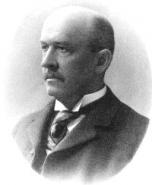Liberty Matters
Sumner, Darwin, and the Role of Biology in Sociological Thinking
 William Graham Sumner addressed the subject of biology not because he was curious to delve into its results, or eager to contribute to its improvement: he was neither an enlightened amateur nor a devoted student. Rather, his intention was to place this science within the sequencing of knowledge that he set out to trace. He then tries to define sociology and its role.
William Graham Sumner addressed the subject of biology not because he was curious to delve into its results, or eager to contribute to its improvement: he was neither an enlightened amateur nor a devoted student. Rather, his intention was to place this science within the sequencing of knowledge that he set out to trace. He then tries to define sociology and its role.In the train of Sumner's scientific thinking biology has an accessory function, but it is nonetheless important: it helps us to understand social life in its most varied manifestations and indeed in its most primitive ramifications. In his works he rarely uses the term "biology," which was still relatively recent in the second half of the 19th century, but on the other hand he frequently refers to "history" and to the "natural sciences," the sciences of life and of living beings that were at the time synonymous.
Sumner was convinced that social matters can and must be studied as natural phenomena which are transformed and are progressively endowed with a power of rationalization.
It is not easy to find in his writings a confirmation of Charles Darwin's ideas, but there is perhaps an anticipation of the idea of "vital force" developed by the French philosopher Henri Bergson. In fact, the publication of the Origin of Species had no direct influence on Sumner.
In his essay Sociology (1881), Sumner explains his social philosophy by linking sociology with biology. He writes :
We have already become familiar, in biology, with the transcendent importance of the fact that life on earth must be maintained by a struggle against nature and also by a competition with other forms of life. In the latter fact biology and sociology touch. Sociology is a science with data with one range of phenomena produced by the struggle for existence, while biology deals with another. The forces are the same, acting on different fields and under different conditions.[101]
Sumner does indeed take up the issues raised by Darwin, albeit in a fairly superficial manner. However, he expresses some serious reservations on the question of the origins of man. Behind this argument, which in the end tries to answer the question of the origins of man on the basis of the moral authority of science, we find at the same time a lively critique of the theory of natural selection.
In the end, Sumner rejects Darwin's hypothesis not out of deference to any theological convictions – for he too is disinclined to invoke the supernatural element of theology in the scientific or philosophical explanation of natural facts – but rather because he considers that hypothesis to be incomplete from a scientific viewpoint.
Yet Sumner does not fully dismiss Darwin's ideas. If he takes issue with certain conclusions of scientific Darwinism, he nevertheless adopts the principles of social Darwinism, which flow essentially from the demographic doctrine of Malthus, based fundamentally on the principle of the "struggle for existence." Moreover, Sumner frequently relies on those principles to counter the socialist theories of his day. But, as a liberal thinker he had no intention of making the "social" a corollary of the "biological." Maybe because, according to him:
Liberty, therefore, does not by any means do away with the struggle for existence. We might as well try to do away with the need of eating, for that would, in effect, be the same thing. What civil liberty does is to turn the competition of man with man from violence and brute force into an industrial competition under which men vie with one another for the acquisition of material goods by industry, energy, skill, frugality, prudence, temperance, and other industrial virtues. Under this changed order of things the inequalities are not done away with. Nature still grants her rewards of having and enjoying, according to our being and doing, but it is now the man of the highest training and not the man of the heaviest fist who gains the highest reward.[102]
Sumner's liberalism begins with this disagreement with social Darwinism, which he opposes from his earliest writings.
Endnotes
[101.] "Sociology" (1881) in William Graham Sumner, War and Other Essays, ed. Albert Galloway Keller (New Haven: Yale University Press, 1919). </titles/345#Sumner_0255_196>.
[102.] "The Challenge of Facts" in William Graham Sumner, The Challenge of Facts and other Essays, ed. Albert Galloway Keller (New Haven: Yale University Press, 1914). </titles/1656#Sumner_0962_52>.
Copyright and Fair Use Statement
“Liberty Matters” is the copyright of Liberty Fund, Inc. This material is put on line to further the educational goals of Liberty Fund, Inc. These essays and responses may be quoted and otherwise used under “fair use” provisions for educational and academic purposes. To reprint these essays in course booklets requires the prior permission of Liberty Fund, Inc. Please contact oll@libertyfund.org if you have any questions.